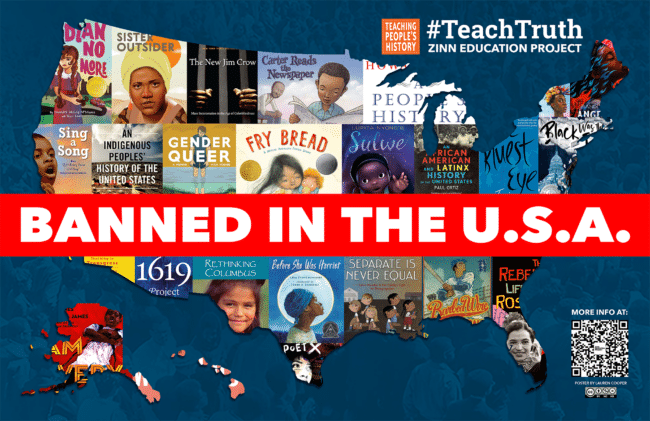
Credit: Zinn Education Project. Creative Common License to copy and distribute for noncommercial purposes.
In 2023, not only are books being banned, but also the right to teach about racism and LGBTQ+ identity — essentially placing thousands more titles off limits. Official lists of banned books (including those in the poster above) reveal only the tip of the iceberg.
In Florida, classroom teachers and librarians are emptying bookshelves rather than risk a felony for having the an unapproved title.
The Oklahoma law HB 1775, passed in 2021, restricts teaching that could make a student “feel discomfort, guilt, anguish or any other form of psychological distress on account of his or her race or sex.”
What book that looks honestly at U.S. history does not risk causing some discomfort for the reader?
Proponents of the bills argue they are protecting children from feeling guilty and from propaganda.
In truth, what concerns the right is young people learning to ask critical questions about our society, to organize for social change, and about the power of interracial solidarity.
In addition to banning books and curriculum, the right threatens teachers who pledge to teach truthfully. They often name particular curricula they seek to ban. For example, the Kennewick School Board in Washington passed a policy in August that prohibits teaching that the United States is fundamentally or systemically racist. In school board discussions, there were references to ensuring that the wording would bar specific curricula, including the 1619 Project and the Zinn Education Project
In Oklahoma, the state has gone beyond attacking individual teachers to punishing entire school districts. Lawmakers’ intent is to stifle discussions about race and justice in every classroom in the state. As Jeremy C. Young and Jeffrey Sachs explain in the Tulsa World,
By wielding censorious punishments on school districts, students, and teachers for imagined violations, [Oklahoma state] has undermined educational freedom on an unprecedented scale.
The recent attacks draw on the same language used over the past decade in attempts to ban people’s history in K–12 classrooms in Arizona, Arkansas, and Indiana. In those cases, outlined below, grassroots efforts helped to protect students’ right to learn.
What Can We Do?
Don’t Let Intimidation Define the Curriculum
When Georgia teacher Katie Rinderle was fired for reading My Shadow Is Purple, dozens of Georgia teachers signed up to receive copies of the book to read to their students and defend their freedom to learn.
Engage Young People: Teach About Book Bans
A team of 4th-grade teachers in D.C. introduced their students to the importance of representation in children’s literature and then they read about book bans across the nation. Students created posters to raise an alarm schoolwide.
We encourage educators to engage students in similar studies of this critical issue.
Create a Pop-up Display
Create an interactive display for your school or library to promote discussions about the dangers of banned books and efforts to defend the freedom to learn. We provide free downloadable display materials and guidelines.
For displays and/or readings of banned books, Teaching for Change’s Social Justice Books offers a list of recommended titles.
With thousands of books banned, Social Justice Books has selected titles that address social issues, such as When Wilma Rudolph Played Basketball. Many of them are not widely known.
Collective Action
Historian Kidada E. Williams reminds us that teachers must work collectively to defend the right to teach truthfully. In the clip below from the Howard Zinn Centennial she notes,
One of the things that we can learn is that there is power in saying that people’s lives, freedoms, and futures matter, and that those declarations inspired people across the generations to collective action.
They still have that power to inspire people to build a more just world today. There are some interconnected lessons that we can learn from our predecessors, and this is something that teachers can take in mind.
One is that fighting for freedom and justice is best done collectively. That fits the Zinn Education Project so well. Teachers can fight and win by working with other educators, with librarians, with students and activists. . . . We also fight these unjust laws by reaching out to lawmakers, by running for office, and by direct action protests.
Library Read-Ins
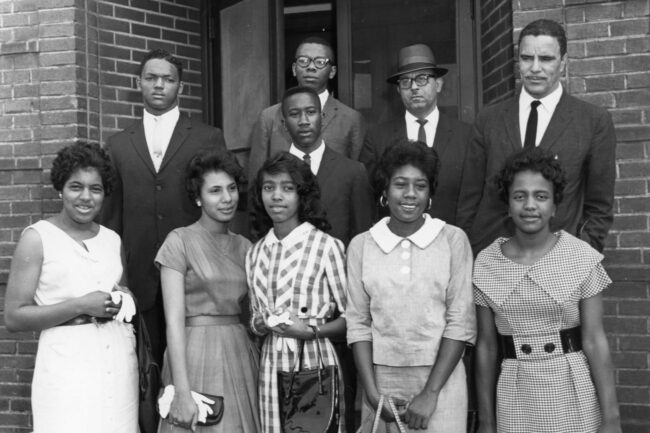
On July 16, 1960, seven students from Sterling High along with college freshman, Jesse Jackson, entered the library and were arrested. This group became known as the Greenville Eight. Source: Greenville County Library
In 1960, high school students led a read-in at a public library in Greenville, South Carolina. May their action, one of countless efforts to demand full access to books, inspire students and teachers today.
Teach Banned History
The book bans and anti-education laws are united in their larger political goal: to rob children of access to a usable past, an account of history that helps them fully see and understand their present. We must not let them. Check out the free downloadable lessons in the #TeachTruth syllabus.
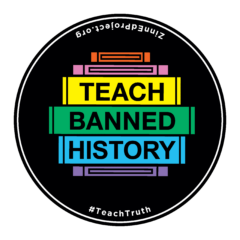 Wear Teach Banned History buttons to promote awareness of how the current legislation bans more than books.
Wear Teach Banned History buttons to promote awareness of how the current legislation bans more than books.
Invite conversations about the need to actively oppose book bans, teach truthfully, and defend LGBTQ+ rights. Remind people that the bans go way beyond books — the attacks target the teaching of history and a more inclusive curriculum. Order buttons.
Find An Event Near You
Check out the calendar of events, coordinated by the American Library Association, Freedom to Read Foundation, the National Education Association, PEN America, PFLAG, Project Censored, and more organizations.
More
Stay informed. Follow PEN America which issues reports, such as Banned in the USA: The Growing Movement to Censor Books in Schools. Sign up for AAPF Truth Be Told updates.
Hold media accountable for accurate coverage of the threats to our freedom to teach and learn.
Engage with your school board by voting, testifying, and consider running for office.
Display Banned in the U.S.A. graphic. Print as an 11 x 17 poster.
People’s History Book Bans in Last Decade
Tucson
In 2012, the Tucson Unified School District decided to abolish the highly successful Mexican American Studies (MAS) Program and called for an immediate removal of all program books, including Rethinking Columbus, Pedagogy of the Oppressed, Occupied America, and Five Hundred Years of Chicano History in Pictures. The Zinn Education Project helped amplify this issue, raising awareness about the threat to all people’s history curricula.
Five years later, in August of 2017, a federal judge ruled that the state of Arizona violated the constitutional rights of students by eliminating the program.
Read about this victory in a Rethinking Schools interview with Mexican American Studies program instructor Curtis Acosta.
Indiana
In 2013, the Associated Press learned of Indiana Governor Mitch Daniels’ orders to ban the use of not just A People’s History of the United States, but any of Howard Zinn’s books in K–12 classrooms shortly after Zinn’s death in 2010. The Zinn Education Project helped give national visibility to this attempt at censorship and the need for academic freedom in all grade levels.
Arkansas
In March of 2017, an Arkansas state representative introduced legislation to prohibit teachers in all public schools or state-supported charter schools from including any books in their curriculum by — or even “concerning” — Howard Zinn.
In response, the Zinn Education Project offered to send free copies of a book by Zinn and A People’s History for the Classroom lessons to any Arkansas middle or high school teacher or school librarian requesting them. In just a few days, we were flooded with requests. Generous donations allowed us to send more than 800 people’s history books to classrooms and libraries all over the state. The bill never made it out of committee.
– – – – – – – – –
In each case, the Zinn Education Project played a key role in making these stories public and defending the rights of teachers and students to teach and learn.
Prison Censorship
In addition to book bans in schools, there is a long and ongoing practice of book censorship for prisoners. Take a look at the Marshall Project’s list of The Books Banned in Your State’s Prisons. Ask students to examine the list for their state and consider why books are censored for prisoners and in schools today. There are also lessons that educators can learn from how prisoners have challenged and evaded the censorship.
Defend People’s History Teachers
Make sure more students read banned books and learn the history missing from textbooks. With your donation to the Zinn Education Project, we can equip thousands more classroom teachers to bring people’s history to millions of students.

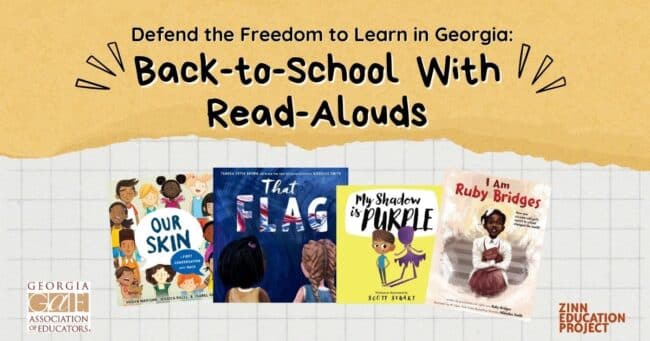
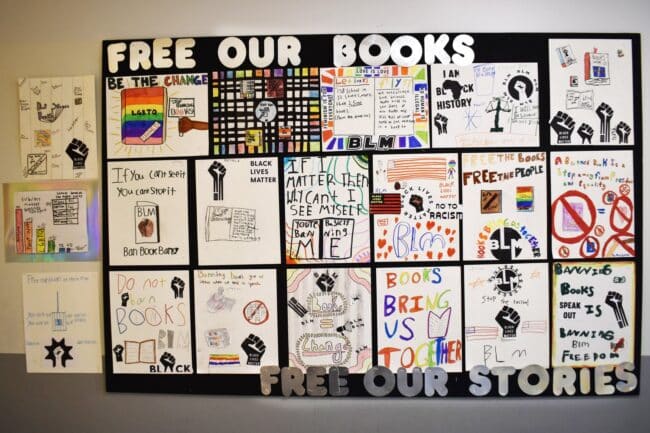
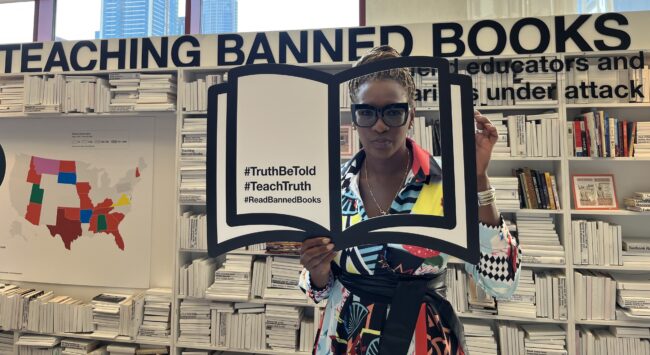
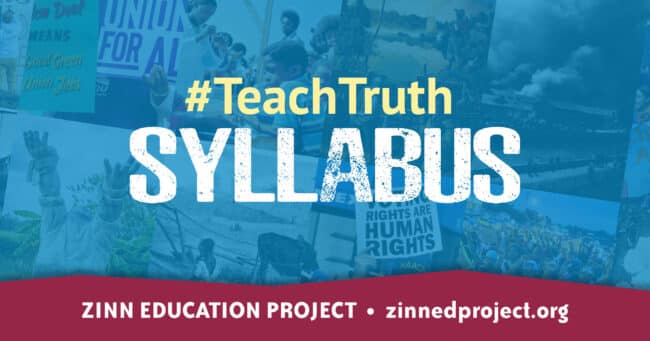
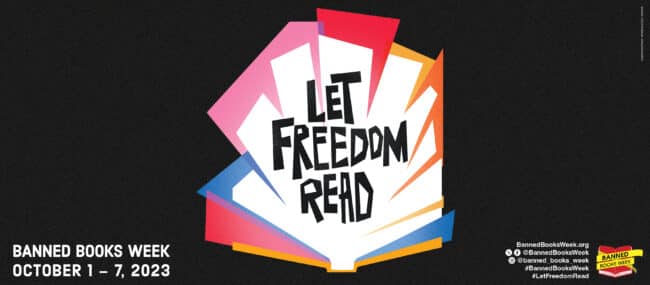
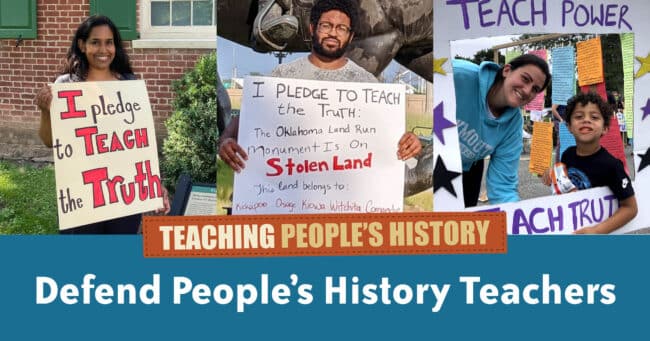
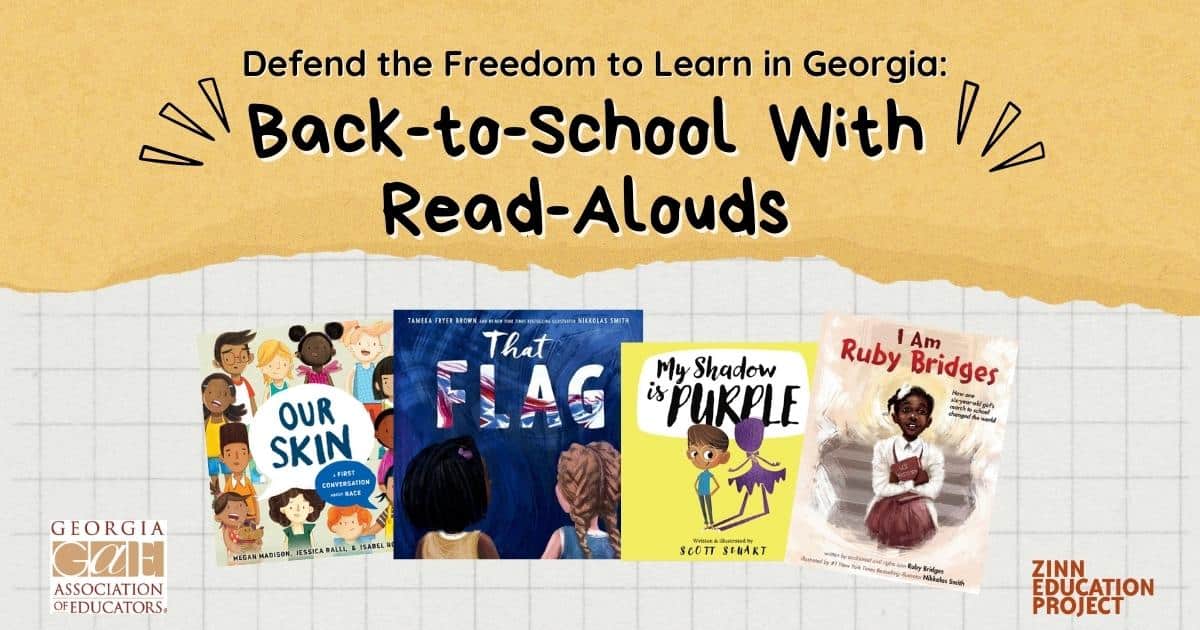





Twitter
Google plus
LinkedIn